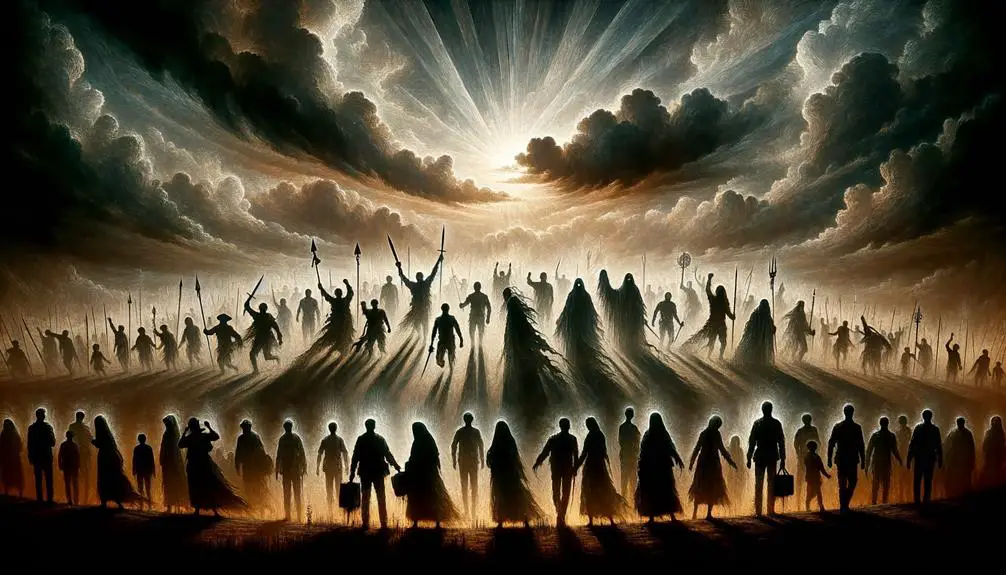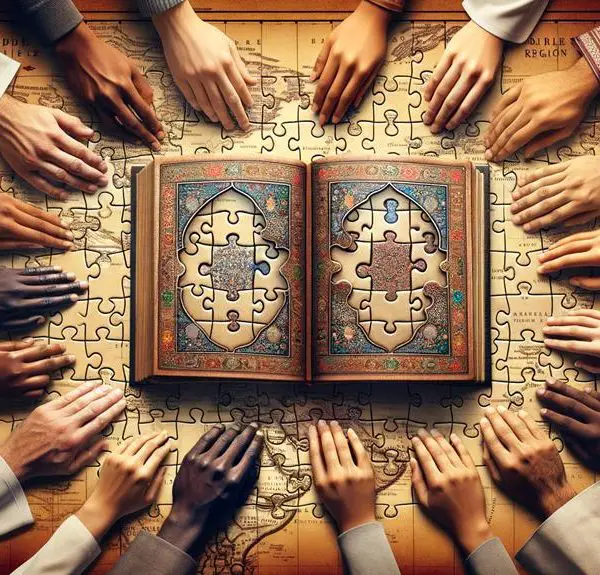Discover the most controversial aspects of the Bible that challenge modern ethics and morals, leaving you questioning historical and divine narratives.

Worst Things in the Bible
It's curious, isn't it, how often you come across passages in the Bible that make you pause and wonder about the context or morality behind them? You're not alone in this.
From genocidal commands to the endorsement of slavery, instances of human sacrifice, laws against women, and divine punishments, the Bible contains elements that challenge modern ethical standards.
As you explore these aspects, you'll find yourself questioning not just the text, but also the historical and cultural contexts that shaped these narratives.
Let's embark on this journey together, and perhaps, uncover insights that could change your perspective.
Key Takeaways
- Biblical texts contain commands for genocidal actions and endorsements of slavery, challenging modern ethical standards.
- Stories of divine punishment and human sacrifice in the Bible reflect ancient societal norms and values, prompting contemporary moral reflection.
- Laws within the Bible disproportionately affect women, highlighting the need for reevaluation in the context of current societal views on gender equality.
- Theological debates and reinterpretations of these narratives are crucial for aligning ancient scripture with modern concepts of justice and morality.
Genocidal Commands

Analyzing the biblical text reveals instances of genocidal commands where God directs the Israelites to annihilate entire populations. These directives, found primarily in the Old Testament, have sparked considerable debate among theologians, historians, and scholars regarding their moral justifications and historical context. You're faced with the challenge of understanding these commands beyond their surface-level brutality to grasp the complexities involved in their interpretation.
In examining these instances, it's crucial to consider the historical context in which these texts were written. The ancient world was marked by constant warfare and tribal conflicts, where survival often necessitated harsh measures. Some scholars argue that these commands were a reflection of the times, aimed at ensuring the Israelites' survival amidst hostile neighbors.
Furthermore, the moral justifications for these commands have been a subject of intense scrutiny. Some interpretations suggest that these actions were commanded as a form of divine judgment against those who practiced morally reprehensible acts, such as child sacrifice. From this perspective, the genocidal commands are seen not merely as acts of indiscriminate violence but as a divine response to egregious moral failings.
However, this interpretation doesn't fully alleviate the ethical discomfort these passages evoke. Critics argue that the annihilation of entire populations, including women and children, can't be morally justified, regardless of the context. This tension between the historical-cultural context and modern ethical standards continues to fuel debates over the interpretation of these difficult passages in the biblical text.
Endorsement of Slavery
Moving beyond the controversial genocidal commands, another challenging aspect of biblical scripture concerns its endorsement of slavery. This facet of the text has long been a point of contention, casting shadows on the broader understanding of Biblical morality. When you delve into the passages, it's clear that the scripture does not merely acknowledge slavery as a part of society but appears to provide a framework for it, thus offering a form of slavery justification.
Passage |
Implication |
Relevance |
|---|---|---|
Leviticus 25:44-46 |
Allows for the ownership of foreign slaves |
Indicates a societal acceptance |
Ephesians 6:5 |
Advises slaves to obey their earthly masters |
Endorses hierarchical human relationships |
1 Peter 2:18 |
Encourages enduring harsh treatment from masters |
Suggests a moral virtue in suffering |
Exodus 21:20-21 |
Dictates punishment for mistreating slaves, yet allows for it under certain conditions |
Reflects on the value of slaves compared to free individuals |
This table illustrates the complexity and diversity of biblical references to slavery, reflecting both the historical context of the times and the challenging implications for interpreting Biblical morality in a contemporary setting. Analyzing these passages, it's essential to grasp the multifaceted nature of the Bible as a historical document influenced by the societal norms of its era. Yet, the endorsement of slavery within its texts remains a stark reminder of the vast moral and ethical evolution that societies have undergone. The justification of slavery within the Bible poses significant challenges for modern readers, compelling a reevaluation of the text's moral and ethical stances in light of contemporary values.
Instances of Human Sacrifice

The examination of biblical texts reveals instances of human sacrifice, presenting a profound challenge to modern interpretations of its ethical frameworks. These narratives, especially those involving child sacrifice, confront readers with stark moral implications that resonate through centuries of theological debate and ethical inquiry.
One notable instance is the story of Abraham's near sacrifice of his son Isaac, a narrative that continues to perplex scholars and believers alike. This act, commanded by God as a test of faith, raises critical questions about obedience, divine morality, and the value of human life. While an angel ultimately stops Abraham, sparing Isaac, the episode underscores a troubling willingness to perform child sacrifice at divine behest, highlighting complex dimensions of faith and morality.
Another example is the story of Jephthah's vow in the Book of Judges, which culminates in the sacrifice of his daughter following a military victory promised by God. This narrative starkly contrasts with modern ethical standards, revealing a historical context where child sacrifice could be conceived as an act of devotion. Such instances not only reflect the cultural and religious norms of the times but also invite intense scrutiny of the moral frameworks underlying biblical texts.
These episodes, among others, challenge readers to grapple with the moral implications of human sacrifice within a sacred text. They prompt critical reflection on the evolution of ethical standards and the complexities of interpreting ancient religious narratives in a contemporary moral landscape. Engaging with these stories demands a nuanced understanding of context, symbolism, and the multifaceted nature of divine-human relationships as portrayed in biblical literature.
Laws Against Women
While reflecting on the moral quandaries of human sacrifice, it's crucial to examine the biblical laws that disproportionately affect women, revealing another layer of ethical complexity in these ancient texts. The Bible, a cornerstone of religious thought and moral guidance for billions, includes passages that have perpetuated female subjugation and marital inequities for centuries.
You'll find that the Old Testament, in particular, codifies various laws that place women in subservient roles. These range from the valuation of a woman's vow, which could be nullified by her father or husband (Numbers 30:3-15), to the laws on marriage and divorce that notably favor men (Deuteronomy 24:1-4). Such prescriptions not only illuminate the gender dynamics of ancient societies but also highlight the enduring struggle against gender inequality.
Moreover, the regulations concerning purity and menstruation (Leviticus 15:19-30) serve as another example of how women's bodies have been subject to control and stigmatization. These laws effectively sideline women, marking them as unclean and, by extension, lesser than men for natural biological processes.
These instances of female subjugation and marital inequities within the Bible underscore the complexities of interpreting sacred texts in a modern context. While they reflect the historical and cultural realities of their time, they also challenge contemporary readers to rethink and reevaluate the application of these ancient laws in today's society. This critical examination not only fosters a deeper understanding of the Bible but also catalyzes discussions on gender equality and the evolution of societal norms.
Divine Punishments

How do divine punishments within the Bible reflect the moral and ethical standards of the time, and what implications do these narratives carry for contemporary interpretations of justice and morality? The Bible's accounts of divine punishments, such as plague outbreaks and the confusion of languages at the Tower of Babel, serve not just as theological lessons but also as reflections of the societal norms and ethical values of their time. These stories embody a conception of justice that is immediate and often collective, contrasting sharply with modern ideas about individual accountability and the separation of sin from consequence.
Event |
Moral or Ethical Lesson |
Contemporary Implication |
|---|---|---|
Plague Outbreaks |
Punishment for collective disobedience or sin |
Questions the fairness of collective punishment |
Tower of Babel |
Consequences of human pride and disobedience |
Reflects on the limits of human ambition |
Destruction of Sodom and Gomorrah |
Divine retribution for wickedness |
Challenges the notion of proportional punishment |
These narratives suggest that divine punishments were perceived not only as retributive but also as corrective, intended to realign societies with moral and ethical standards believed to be divinely ordained. Today, these stories prompt critical reflection on the nature of justice, morality, and the role of divine intervention in human affairs. They encourage you to question the balance between justice and mercy, the collective versus the individual, and the temporal versus the eternal. Understanding these ancient narratives in their historical context allows for a nuanced interpretation of their significance in contemporary discussions on morality and ethics.
Frequently Asked Questions
How Do Modern Theologians and Religious Scholars Reconcile These Problematic Aspects of the Bible With the Teachings of Love and Compassion?
You might wonder how scholars address the Bible's challenging parts while upholding its messages of love and compassion. They often highlight the concept of divine forgiveness and ethical evolution.
This approach suggests that as humanity's understanding of ethics grows, so too does the interpretation of these ancient texts. By examining the Bible through this lens, scholars reconcile its problematic aspects with its core teachings, offering a nuanced view that respects historical context and moral progress.
Are There Any Historical or Cultural Contexts That Could Potentially Justify or Explain the Reasoning Behind These Controversial Passages?
You're delving into a complex inquiry, where cultural relativism and ethical evolution intertwine. Historically, societal norms and ethics evolved differently across cultures, offering a lens through which to view these controversial passages.
While it's challenging, understanding the historical and cultural contexts can shed light on the reasoning behind them. Analyzing these aspects doesn't justify the actions but provides a scholarly perspective on their origins and their reflection of human ethical evolution.
How Have Different Branches of Christianity and Judaism Interpreted These Difficult Parts of the Bible Differently?
When you examine how various Christian and Jewish denominations interpret the Bible, you'll find a spectrum of beliefs about scriptural infallibility and hermeneutic diversity.
Some view the texts as inerrant, guiding moral and ethical decisions, while others approach them with a more critical, historical lens, acknowledging cultural and temporal influences.
This range in interpretation highlights the complex relationship believers have with their sacred texts, navigating between reverence and the quest for contemporary relevance.
What Role Do Translations and Variations of Biblical Texts Play in the Understanding and Interpretation of These Contentious Issues?
Navigating biblical texts is like exploring a vast ocean: deep and complex. The role of translations and variations can't be overstated. They act as both compass and map, guiding interpretations through the waters of Manuscript authenticity and the currents of Linguistic evolution.
These elements are crucial in understanding contentious issues, as each translation or textual variation can shed new light or cast shadows on our comprehension of these ancient writings.
How Do Non-Religious and Secular Critics View These Aspects of the Bible, and What Impact Do They Believe It Has on Society and Moral Development?
You might wonder how secular critics perceive the Bible's influence on society and moral development.
They often argue that its stories and teachings, when interpreted without religious bias, can hinder ethical evolution and societal integration.
These critics believe that by promoting outdated or intolerant views, the Bible may slow progress towards a more inclusive and morally advanced society.
They advocate for a critical examination of these texts to foster a better understanding and adaptation to modern values.
Conclusion
In your exploration of the darker aspects of the Bible, it's crucial to delve beyond surface interpretations.
The narratives of genocidal commands, slavery endorsements, human sacrifices, gender-based laws, and divine punishments aren't just historical accounts but complex theological and moral conversations.
Analyzing these elements through a scholarly lens reveals not just the evolution of moral understanding but also invites a deeper engagement with the text.
This approach doesn't just challenge beliefs but enriches your comprehension of religious and ethical development over millennia.



Sign up